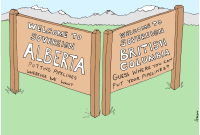Support strong Canadian climate journalism for 2025
Farmers across New Zealand took to the streets on their tractors Thursday to protest government plans to tax cow burps and other greenhouse gas emissions, although the rallies were smaller than many had expected.
Lobby group Groundswell New Zealand helped organize more than 50 protests in towns and cities across the country, the biggest involving a few dozen vehicles.
Last week, the government proposed a new farm levy as part of a plan to tackle climate change. The government said it would be a world first, and that farmers should be able to recoup the cost by charging more for climate-friendly products.
Because farming is so big in New Zealand — there are 10 million beef and dairy cattle and 26 million sheep, compared to just 5 million people — about half of all greenhouse gas emissions come from farms. Methane from burping cattle makes a particularly big contribution.
But some farmers argue the proposed tax would actually increase global greenhouse gas emissions by shifting farming to countries less efficient at making food.
At the protest in Wellington, farmer Dave McCurdy said he was disappointed in the small turnout, but said most farmers were working hard on their farms during a spell of good spring weather at a particularly busy time of year.
He said farmers were good environmental stewards.
“It’s our life, our family’s lives," he said. “We’re not out there to wreck it, we wouldn’t make any money. We love our farms. That’s what annoys us. We’re painted at these bad guys, but a lot of farmers have spent generations looking after that land.”
He said the proposed tax didn't take proper account of all the trees and brush he and other farmers had planted, which helped trap carbon and offset emissions. He said if the proposed tax and herd reductions went ahead, it would be ruinous to many farmers.
“I’m out,” he said. “Waste of time.”
Farming remains vital to New Zealand's economy. Dairy products, including those used to make infant formula in China, are the nation’s largest export earner.
McCurdy said farmers had almost singlehandedly kept the economy afloat during the COVID-19 lockdowns, and now that the threat had passed and a recession was looming, the government was coming after them.
New Zealand Prime Minister Jacinda Ardern has pledged the nation will become carbon neutral by 2050. Part of that plan includes reducing methane emissions from farm animals by 10% by 2030 and by up to 47% by 2050.
The government had worked with farmers and other groups to try to come up with an emissions plan they could all live with. But many farmers have been incensed by the government's final proposal, while environmentalists have said it doesn't go nearly far enough.
Farmer Matt Swansson said he'd “had a gutsful” of the government and would consider refusing to pay the new tax.
He said on beautiful evenings on his farm, he thinks he has the best job in the world.
“But when it’s rain, drizzle, and you get home and listen to the news," Swansson said. “Why do you bother?"




Comments